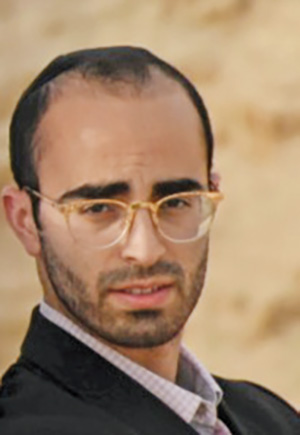
Moshe Rabbeinu calls in the Bnei Yisrael for a serious huddle-up. He begins to speak to them about the topic of Shabbat, as well as many details related to the Mishkan. At the conclusion of this holy huddle-up, the pasuk states that the entire congregation of Bnei Yisrael departed from before Moshe (Vayakhel 35:20). We already know from the first pasuk in the parsha that the Jews were with Moshe; why then is this pasuk stressing that they left Moshe’s presence? From before whom else could they have taken leave?
I heard from Rabbi Eli Mansour the following explanation based on Rav Eliyahu Lopian: When you see a person walking in the street, just by the way he is walking and his disposition, many times you can tell where this person just came from. [For example, you see someone walking in the street wobbling, tripping over his own feet, slurring his words, and clutching a bottle of Jack for dear life: you know he just came from the bar. Or someone else you see flexing his muscles, punching the air, walking like he’s Arnold, and clutching his bottle of whey protein for dear life: you know he’s coming from the gym]. Explains Rav Lopian, when someone leaves a Torah class, or when someone leaves the yeshiva, or when someone leaves the synagogue, after he leaves it should be evident from his actions afterward and everyone will know this person just came from the synagogue or from the yeshiva or from a Torah class. His behavior should indicate that he just came from such a place. Which means, that shiur, that tefillah, that experience of being absorbed in learning should stimulate and cause a change in that person so that when someone sees him they will be able to identify where he just came from. He can’t be the same person before and after. The pasuk stresses that they left “from before Moshe” to teach that it was evident after they left that if you saw them you would have said, “These people were just in front of Moshe.” Even after the Bnei Yisrael left “from before Moshe,” it was nevertheless clear that they were just “before Moshe.”
This idea, I believe, is the cornerstone of what it means to be a “practicing” Jew. The mitzvot we do are meant to change us to the extent that we become greater than we were before. The goal of anything we do in our practice is intended to refine us, to enhance our relationship with ourselves, other people and Hashem. This is not always so easy. How many times have you heard an amazing shiur or idea about a certain area of your life that you’re trying to improve, and although inspired by it you have a hard time putting it into action? Too often we get sidetracked by the thrill of the learning or inspiration until we realize that actually implementing those ideas is a whole different world. Translating the academia into practice is one of the hallmarks of a Jew who has matured spiritually.
Moshe Rabbeinu gave the pump up, but maybe the credit also goes to the listeners, the Bnei Yisrael who perhaps allowed the learning and the lessons to permeate their essence to the point that it stirred a real change in them so that they became different and better people. We too have this incredible ability to become a completely different person simply upon engaging in a spiritual act. But a lot of that has to do with us, not necessarily the speaker’s eloquence and impassioned delivery, the shaliach tzibur’s beautiful and melodious chazanut, and not always even the penetrating words of sifrei mussar and Chazal. We have to do our job also, and that is to personally take control of that situation so that the good actions we do permeate our very being to the point that we become a different person. This might mean putting in extra effort in understanding the lesson, or putting in more of an emotional desire to sincerely want to implement the ideas, or to simply let go of any resistance that might be holding us back. But whatever it may be, each one of us needs to look into our own experience when we’re involved in ruchniyut and try to notice how much of an impact that given experience made on us, and what can be done to let it be more impactful—how we can let it change us. A person—day in, day out—can go through all the motions of religious practice yet remain the same he or she was five, 10 or 15 years ago. But through each good deed we have the remarkable opportunity to indeed change and become vastly greater than the person we were just a few moments prior.
By Binyamin Benji
Binyamin Benji currently learns in Rabbi Shachter’s kollel at Yeshivas Rabbi Yitzchak Elchanan and is a semicha candidate there as well. He holds an MSW from Wurzweiler School of Social Work and is the author of the weekly Torah portion in the Sephardic Congregation of Paramus’ newsletter. He can be reached at [email protected].













